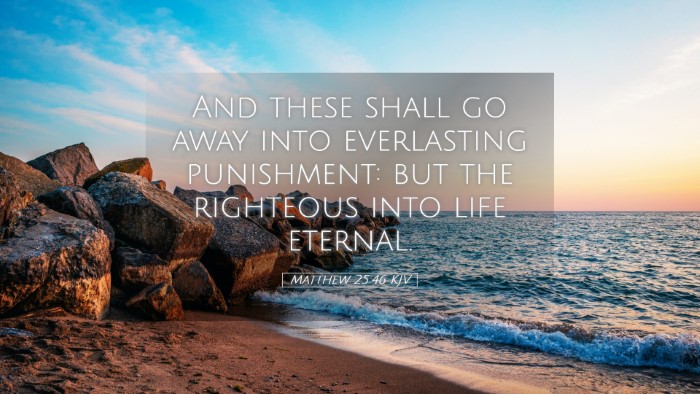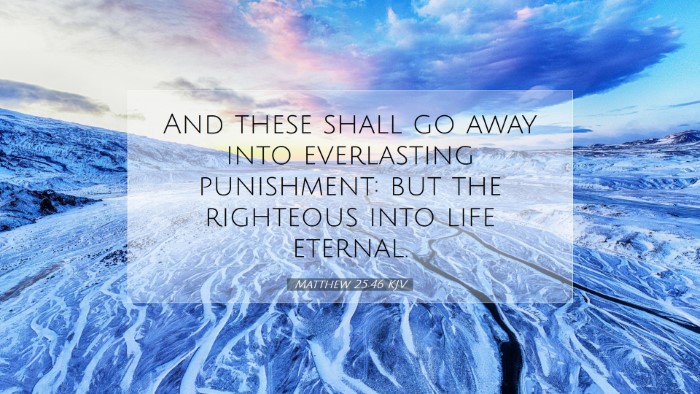Commentary on Matthew 25:46
Verse Reference: Matthew 25:46 - "And these shall go away into everlasting punishment: but the righteous into life eternal."
Introduction
This verse serves as a climactic conclusion to the teachings of Jesus regarding the final judgment, contrasting the eternal destinies of the wicked and the righteous. It is imperative for pastors, theologians, students, and scholars to grasp the significance of this verse in the context of the surrounding parables and teachings.
Contextual Overview
The surrounding context includes the parables of the Ten Virgins and the Talents, both emphasizing preparedness and accountability. Matthew 25 climaxes with the description of the Last Judgment, highlighting the criteria by which individuals will be judged—primarily faith manifested through deeds.
Insights from Public Domain Commentaries
Matthew Henry's Commentary
Matthew Henry emphasizes the stark dichotomy presented in this verse between two eternal states. He notes:
- Everlasting Punishment: Henry elaborates on the gravity of this phrase, asserting that 'everlasting' signifies a punishment that is endless and unremitting. It serves as a solemn warning against neglecting one’s spiritual condition.
- Life Eternal: In contrast, the promise of 'life eternal' signifies not only the duration but the quality of life in communion with God. The righteous are rewarded with a state of existence that is fully aligned with divine fellowship.
Albert Barnes' Notes
Albert Barnes provides a detailed exposition of the terms used in this verse:
- “These shall go away”: Barnes points out that the phrase indicates a definitive separation, underscoring the finality of God’s judgment. The term 'go away' suggests relocation to a state devoid of God’s presence.
- “Into everlasting punishment”: He interprets this reference as a clear allusion to hell—a place of enduring consequence for unrepented sin. It reflects the justice of God who cannot overlook sin.
- “The righteous into life eternal”: He highlights that this life is not merely endless but encompasses the fullness of joy and peace found in relationship with God, providing certainty to believers regarding their ultimate destiny.
Adam Clarke's Commentary
Adam Clarke offers a nuanced interpretation focusing on the moral implications of this verse:
- Moral Responsibility: Clarke emphasizes accountability for one’s actions. The distinction made in the verse is a response to how individuals have acted in their lifetime, showcasing an ethical dimension of faith.
- Nature of Eternal Existence: He delves into the philosophical aspects of 'eternal life' and the nature of existence beyond death. Clarke argues that eternal life with God represents completeness and fulfillment, contrasting sharply with the despair found in eternal punishment.
Theological Implications
The verse highlights several key theological points:
- Judgment and Accountability: It reminds believers and non-believers alike of an impending judgment, calling for a life lived in accordance with God’s will.
- The Nature of God’s Justice: The eternal destinies of individuals reflect God’s justice, whereby He rewards righteousness and punishes wickedness in a manner consistent with His holy character.
- Eschatological Hope and Warning: For believers, this verse underscores hope for eternal life, while serving as a sober reminder of the consequences of rebellion against God.
Application for Life and Ministry
In light of the insights derived from comprehensive commentaries, several applications can be made:
- Preaching and Teaching: Pastors are encouraged to incorporate themes of eternal judgment and grace in their sermons. This fosters a deeper understanding of God’s justice and mercy.
- Personal Reflection: Believers are urged to engage in self-examination concerning their faith and actions, aligning their lives in readiness for the judgment day.
- Evangelism: This verse serves as a powerful impetus for outreach efforts. Understanding the eternal consequences of one's state can drive the urgency of spreading the Gospel.
Conclusion
Matthew 25:46 encapsulates profound truths about the stark realities of eternal destinies. Through the lens of public domain commentaries, we gain insights that remind us of the gravity of our choices in this life, urging us toward a life that honors God and extends love and hope to others.


